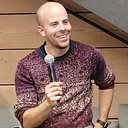Why I walk the path of awakening
I walk the path of awakening for one very practical reason: to overcome anxiety. Anxiety has had me in its grips for a very long time, and it sucks all the wonder and joy out of life. It’s had many of my friends in its grips too. It grips the whole world. To overcome it would be truly glorious.
When I first learned about the path, I was attracted to it as a wonderful adventure, as a doorway to some indescribably deep and important truth, and as a way to become vigorous and courageous like the teachers I so admired. These are sound and good motivations, and they are alive in me still, but as I contemplate giving all of myself to this path, I find that I must become practical in my motivations. And for me, overcoming anxiety is extremely practical.
Along the path, we first learn to see anxiety as an object, rather than just reflexively engaging with it. This is already great progress. Then we learn to temporarily blow out the candle of anxiety using the posture and the breath. This is helpful, but anxiety arises again, and sometimes we don’t even see that it has us in its grips. Then we see that anxiety is caused by clinging and resistance, so we seek to uproot these from our lives. To do this we must bring our lives into alignment with our truest selves, so we make sweeping changes to become honest and trustworthy. But still attachment and clinging continue to arise, and we see that to uproot them completely we must shut down the out of control mind that we live with. To do this we use concentration to bring attention so completely to a single point that we stop feeding the inputs that perpetuate mind, and then the mind itself winds down, since all its constituent parts have the nature of arising and passing away, and if we cease generating new arising then everything already in motion just passes away and what’s left is emptiness. This is awakening, and this is also the final end of anxiety. In fact it is the end of all suffering.
In walking the path of awakening, we can sometimes wind up adding to our sorrows by becoming attached to proxy goals. We start off seeking an exciting adventure (a marvelous goal) but soon we are seeking the approval of our teacher and trying to construct meditative experiences of samadhi or jhanna in order to convince them of our attainments. In this way we forget our original goal and in fact thwart its achievement by spending our time on the cushion trying to construct more of exactly the candles we really want to be extinguishing.
For this reason we must get practical, which means having true practical goals for our practice that keep us focused on actually progressing rather than on convincing ourselves that we are progressing. My goal is to end anxiety. I can measure this. I can see how much time I’m spending in anxiety. I can find out whether I am able to convey wonder and joy to my friends. I can find out whether I am able to lead groups and address crowds. And I can connect all of this back to my practice, seeing always the connection between what I’m doing during this sit and my goal of ending anxiety.
Anxiety is just one of the five hindrances, and in time I’m sure I’ll expand my goal to end all of them. And it is said that the five hindrances really are just five particular manifestations of a single deeper evil, and perhaps I’ll see this truth for myself some day. And beyond that the true goal, as the Buddha said, is to end all suffering.
And the path and our understanding of it is always evolving too.
But for now, my goal is to end anxiety.
